21世纪大学英语第一册Unit 1
21世纪大学英语英语课文讲解unit1( B )
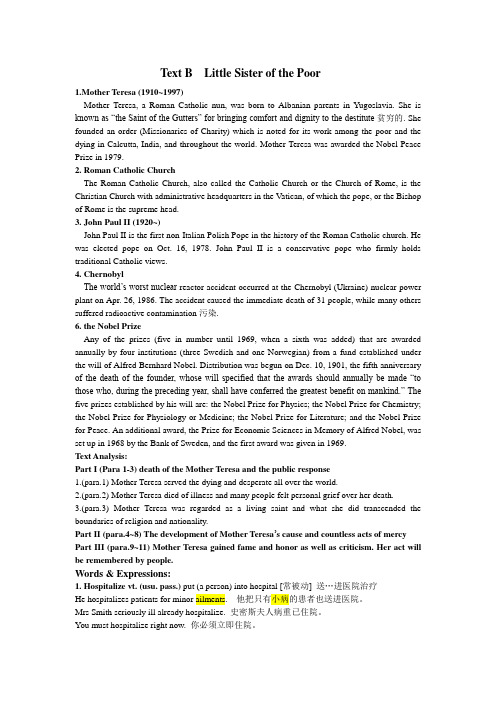
Text B Little Sister of the Poor1.Mother Teresa (1910~1997)Mother Teresa, a Roman Catholic nun, was born to Albanian parents in Yugoslavia. She is known as “the Saint of the Gutters” for bringing comfort and dignity to the destitute贫穷的. She founded an order (Missionaries of Charity) which is noted for its work among the poor and the dying in Calcutta, India, and throughout the world. Mother Teresa was awarded the Nobel Peace Prize in 1979.2. Roman Catholic ChurchThe Roman Catholic Church, also called the Catholic Church or the Church of Rome, is the Christian Church with administrative headquarters in the Vatican, of which the pope, or the Bishop of Rome is the supreme head.3.John Paul II (1920~)John Paul II is the first non-Italian Polish Pope in the history of the Roman Catholic church. He was elected pope on Oct. 16, 1978. John Paul II is a conservative pope who firmly holds traditional Catholic views.4. ChernobylThe world’s worst nuclear-reactor accident occurred at the Chernobyl (Ukraine) nuclear power plant on Apr. 26, 1986. The accident caused the immediate death of 31 people, while many others suffered radioactive contamination污染.6. the Nobel PrizeAny of the prizes (five in number until 1969, when a sixth was added) that are awarded annually by four institutions (three Swedish and one Norwegian) from a fund established under the will of Alfred Bernhard Nobel. Distribution was begun on Dec. 10, 1901, the fifth anniversary of the death of the founder, whose will specified that the awards should annually be made “to those who, during the preceding year, shall have conferred the greatest benefit on mankind.” The five prizes established by his will are: the Nobel Prize for Physics; the Nobel Prize for Chemistry; the Nobel Prize for Physiology or Medicine; the Nobel Prize for Literature; and the Nobel Prize for Peace. An additional award, the Prize for Economic Sciences in Memory of Alfred Nobel, was set up in 1968 by the Bank of Sweden, and the first award was given in 1969.Text Analysis:Part I (Para 1-3) death of the Mother Teresa and the public response1.(para.1) Mother Teresa served the dying and desperate all over the world.2.(para.2) Mother Teresa died of illness and many people felt personal grief over her death.3.(para.3) Mother Teresa was regarded as a living saint and what she did transcended the boundaries of religion and nationality.Part II(para.4~8) The development of Mother Teresa’s cause and countless acts of mercy Part III(para.9~11) Mother Teresa gained fame and honor as well as criticism. Her act will be remembered by people.Words & Expressions:1. Hospitalize vt. (usu. pass.) put (a person) into hospital [常被动] 送…进医院治疗He hospitalizes patients for minor ailments. 他把只有小病的患者也送进医院。
21世纪大学英语第一册Unit1_Bppt课件

Unit 1: Part B
.
Unit 1: Part A
• Revision of Text A • Text B • Listening Practice • Assignment
.
Revision of Text A
Review of Text A • Exercises Check-up
.
Exercises 2. 据史密斯教授说,幸福就是你能充分利用你所有的一切。 according to Prof. Smith make the most of
Happiness, according to Prof. Smith, is the ability to make the most of what you have.
.
Exercises 3. 你最好把这本书放在你15岁的儿子找不到的地方。 keep the book where … your son can’t get his hands on
You’d better keep the book where your 15-year-old son can’t get his hands on.
time so that y《ou读ca写n 教__o_程r_g_aInf》uizlel:y/moEanxky.eoXtuhIre,lmepso.sso1tn3osf. Additionally, it
is essential to _____ your time andirmrealetverainatls. When you read, it's alright to skip over passages which are _____ to your Tstaukdiny.gThe way you behave in clraestsaiisn/adlsigoeismt/apbosrotarnbt. _____ good notes will help you _____ the informwahtieotnhewr hich is presented and asking questions will let you know _____ you have got the point or not. Finalalpy,pirfoyaocuhesstudy with a group, you can learn more from the different _____ and solutions of the other students.
21世纪大学英语-基础版Unit-1

I. Objectives II. Suggested Teaching Plan III. Background Information IV. Class Presentation
21世纪大学英语(S版)综合教程1
21st Century College English
then answer the questions about the conversation. Sections 5
The teacher briefly explains the new words in Useful Language and directs the students to listen to the conversation twice and then do the multiple choice questions.
21世纪大学英语(S版)综合教程1
21st Century College English
Unit 1 Freshmen
Time Contents
1 period Themerelated Listening
Plan
names of the three speakers; B. listen to the short conversation again and
classpresentationunit1freshmen21世纪大学英语s版综合教程121stcenturycollegeenglishunit1main2partilisteningpartiireadingpartiiispeakingpartivtranslationwritingpartvtimetorelaxvideoexercisesunit1freshmen21世纪大学英语s版综合教程121stcenturycollegeenglishfromstudyingthisunitstudentsareexpected
21世纪大学英语第一册
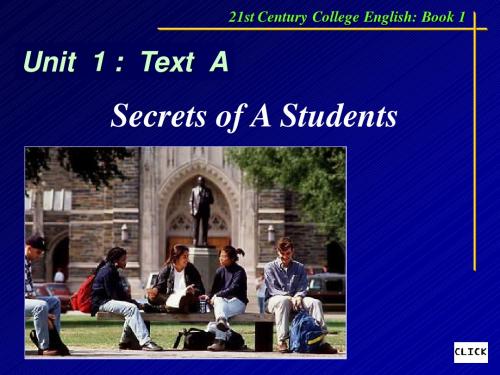
Text Organization
The structure of Text A
I.
The importance of the study skills by two specific examples
Para. 1-3
II.
Secrets of A students—8 study skills
Intensive Study
Secrets of A Students
By Edwin Kiester & Sally Valentine Kiester
1
Alex, now a first-year student in natural sciences at
Cambridge, played football for his school in Manchester and directed the school production of a play. He left school with five A’s. Amanda, reading English at Bristol University, acted in plays at hers, and played tennis regularly. Yet she still managed to get four A’s.
21st Century College English: Book 1
Unit 1 : Text A
Secrets of A Students
Unit 1: Text A
• Lead-in Activities • Text Organization • Reading & Writing Skills • Language Points • Guided Practice
大学英语读写教程第一册Reading Alound
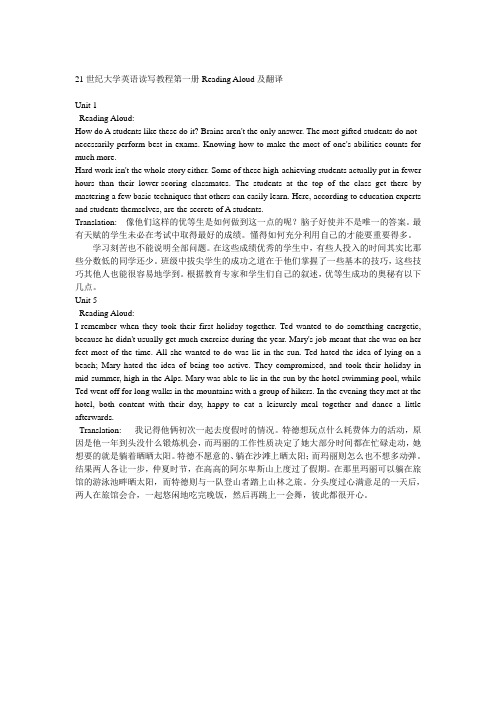
21世纪大学英语读写教程第一册Reading Aloud及翻译Unit 1Reading Aloud:How do A students like these do it? Brains aren't the only answer. The most gifted students do not necessarily perform best in exams. Knowing how to make the most of one's abilities counts for much more.Hard work isn't the whole story either. Some of these high-achieving students actually put in fewer hours than their lower-scoring classmates. The students at the top of the class get there by mastering a few basic techniques that others can easily learn. Here, according to education experts and students themselves, are the secrets of A students.Translation: 像他们这样的优等生是如何做到这一点的呢?脑子好使并不是唯一的答案。
最有天赋的学生未必在考试中取得最好的成绩。
懂得如何充分利用自己的才能要重要得多。
学习刻苦也不能说明全部问题。
在这些成绩优秀的学生中,有些人投入的时间其实比那些分数低的同学还少。
班级中拔尖学生的成功之道在于他们掌握了一些基本的技巧,这些技巧其他人也能很容易地学到。
根据教育专家和学生们自己的叙述,优等生成功的奥秘有以下几点。
关于21世纪大学英语课文翻译unit1

Unit 1 Book 3Do you remember your first love? All those exciting and wonderful new emotions – the way your heart raced when that special person was near –those anxious, awkward moments when you didn't know what to say or do? And then (for most of us) that sad moment when for one reason or another it all came to an end … Ernest Hemingway once said, "Every love story ends as a tragedy" – but the authors of the texts in this unit have a different point of view. Text A focuses on the unexpected side effects of the author's first venture into romance, while Text B recalls the ups and downs of the author's great love for … his car! Finally, the authors of Text C offer some fascinating advice about how to successfully navigate romantic relationships.Text A How I Got SmartA common misconception amongyoungsters attending school is that theirteachers were child prodigies. Who else but abookworm, with none of the normal kid'stendency to play rather than study, wouldgrow up to be a teacher anyway?I've tried desperately to explain to my students that the image they have of me as an enthusiastic devotee of books and homework during my adolescence was a bit out of focus. On the contrary, I hated compulsory education with a passion. I could never quite accept the notion of having to go to school while the fish were biting.But in my sophomore year, something beautiful and exciting happened. Cupid aimed his arrow and struck me right in the heart. All at once, I enjoyed going to school, if only to gaze at the lovely face in English II.My princess sat near the pencil sharpener, and that year I ground up enough pencils to fuel a campfire. Alas, Debbie was far beyond my wildest dreams. We were separated not only by five rows of desks, but by about 50 I.Q. points. She was the top student in English II, the apple of Mrs. Larrivee's eye.Occasionally, Debbie would catch me staring at her, and she would flash a smile that radiated intelligence and quickened my heartbeat. It was a smile that signaled hope and made me temporarily forget the intellectual gulf that separated us.I schemed desperately to bridge that gulf. Andone day, as I was passing the supermarket, an ideacame to me. A sign in the window announced thatthe store was offering the first volume of a set ofencyclopedias at the special price of 29 cents. Theremaining volumes would cost $2.49 each.I purchased Volume I -- Aardvark to Asteroid -- and began my venture into the world of knowledge. I would henceforth become a seeker of facts. I would become Chief Brain in English II and sweepmy princess off her feet with a surge of erudition.I had it all planned.My first opportunity came one day in thecafeteria line. I looked behind me and there shewas.“Hi,” she sai d.After a pause, I wet my lips and said, “Know where anchovies come from?”She seemed surprised. “No, I don't.”I breathed a sigh of relief. “The anchovy lives in salt water and is rarely found in fresh water.” I had to talk fast, so that I co uld get all the facts in before we reached the cash register. “Fishermen catch anchovies in the Mediterranean Sea and along the Atlantic coast near Spain and Portugal.”“How fascinating,” said Debbie, shaking her head in disbelief. It wasobvious that I had made quite an impression.A few days later, during a fire drill, I casuallywent up to her and asked, “Ever been to theAleutian Islands?”“Never have,” she replied.“Might be a nice place to visit, but I certainly wouldn't want to live there,” I said.“Why not?” said Debbie, playing right into my hands.“Well, the climate is forbidding. There are no trees on any of the 100 or more islands in the group. The ground is rocky and very little plant life can grow on it.”“I don't think I'd even care to visit,” she said.The fire drill was over and we began to file into the building, so I had to step it up to get the natives in. “The Aleuts are short and sturdy and have dark skin and black hair. They live on fish, and they trap blue foxes and seals for their valuable fur.”Debbie's eyes widened in amazement.One day I was browsing through the library. Ispotted Debbie sitting at a table, absorbed in acrossword puzzle. She was frowning, apparentlystumped on a word. I leaned over and asked if I couldhelp.“Four-letter word for Oriental female servant,” Debbie said.“Try amah,” I said, quick as a flash.Debbie filled in the blanks, then turned to stare at me in amazement. “I don't believe it,” she said. “I just don't believe it.”And so it went, that glorious, joyous, romantic sophomore year. Debbie seemed to relish our little conversations and hung on my every word.Naturally, the more I read, the more my confidencegrew.In the classroom, too, I was gradually making mypresence felt. One day, during a discussion ofColeridge's “The Ancient Mariner”, we came across theword albatross.“Can anyone tell us what an albatross is?” asked Mrs. Larrivee.My hand shot up. “The albatross is a large bi rd that lives mostly in the ocean regions below the equator, but may be found in the north Pacific as well. The albatross measures as long as four feet and has the greatest wingspread of any bird. It feeds on fish and shellfish. The albatross has an enormo us appetite, and when it's full it has trouble getting into the air again.”There was a long silence in the room. Mrs. Larrivee couldn't quite believe what she had just heard. I sneaked a look at Debbie and gave her a big wink.She beamed proudly and winked back.What I failed to perceive was that Debbie all thiswhile was going steady with a junior from aneighboring school -- a basketball player with a C+average. The revelation hit me hard, and for a while Ifelt like forgetting everything I had learned. I had savedenough money to buy Volume II --Asthma to Bullfinch-- but was strongly tempted to invest in a basketball instead.I felt not only hurt, but betrayed. Like Agamemnon, but with less drasticconsequences, thank God.In time I recovered from my wounds. The next yearDebbie moved from the neighborhood and transferred toanother school. Soon she became no more than a memory.Although the original incentive was gone, I continuedporing over the encyclopedias, as well as an increasing number of other books. Having tasted of the wine of knowledge, I could not now alter my course. For:“A little knowledge is a dangerous thing:Drink deep, or taste not the Pierian spring.”So wrote Alexander Pope, Volume XIV -- Paprika to Pterodactyl.斯蒂夫· 普罗迪上学的孩子们中间有一种普遍的错误想法,即认为他们的老师当年都是些神童。
21世纪大学实用英语综合教程第一册听力答案及原文(1-4单元).
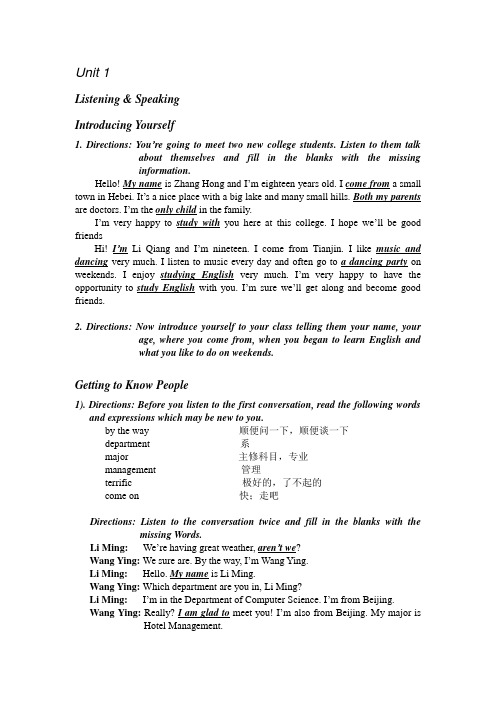
Unit 1Listening & SpeakingIntroducing Yourself1. Directions: You’re going to meet two new college students. Listen to them talkabout themselves and fill in the blanks with the missinginformation.Hello! My name is Zhang Hong and I’m eighteen years old. I come from a small town in Hebei. It’s a nice place with a big lake and many small hills. Both my parents are doctors. I’m the only child in the family.I’m very happy to study with you here at this college. I hope we’ll be good friendsHi! I’m Li Qiang and I’m nineteen. I come from Tianjin. I like music and dancing very much. I listen to music every day and often go to a dancing party on weekends. I enjoy studying English very much. I’m very happy to have the opportunity to study English with you. I’m sure we’ll get along and become good friends.2. Directions: Now introduce yourself to your class telling them your name, yourage, where you come from, when you began to learn English andwhat you like to do on weekends.Getting to Know People1). Directions: Before you listen to the first conversation, read the following wordsand expressions which may be new to you.by the way 顺便问一下,顺便谈一下department 系major 主修科目,专业management 管理terrific 极好的,了不起的come on 快;走吧Directions: Listen to the conversation twice and fill in the blanks with the missing Words.Li Ming:We’re having great weather, aren’t we?Wang Ying: We sure are. By the way, I’m Wang Ying.Li Ming:Hello. My name is Li Ming.Wang Ying: Which department are you in, Li Ming?Li Ming: I’m in the Department of Computer Science. I’m from Beijing.Wang Ying: Really? I am glad to meet you! I’m also from Beijing. My major is Hotel Management.Li Ming: That’s terrific. My classmate Jun Jun is over there. She’s fromShanghai. Come on, I’d like you to meet her.Directions: Now listen to the conversation again and answer the following questions1. Which department is Li Ming in?He is in the Department of Computer Science.2. Where is Li Ming from?He is from Beijing.3. Which department is Wang Ying in?She is in the Department of Hotel Management.4. Where is Wang Ying from?She is also from Beijing.5. What does Li Ming want Wang Ying to do?He wants her to meet his classmate Jun Jun.2). Directions: Before you listen to the second conversation, read the followingwords which may be new to you.apartment 房间baggage 行李upstairs 往楼上Directions: Listen to the conversation twice and fill in the blanks with the missing words.Li Ming:Jun Jun, I’d like you to meet my new friend Wang Ying.Jun Jun:It’s a pleasure to meet you, Wang Ying. My name is Zhang Xiaojun, but everybody calls me Jun Jun.Wang Ying: How do you do, Jun Jun?Jun Jun:How do you do?Li Ming:Wang Ying is in the Department of Hotel Management. She is from Beijing and has just arrived.Jun Jun: So you two come from the same city, don’t you?Li Ming & Wang Ying: Yes.Jun Jun:Have you found your apartment, Wang Ying?Wang Ying: Yes, I’ve been told it’s on the 3rd floor of this building.Jun Jun:That’s good. Let me help you carry the baggage upstairs.Wang Ying:Oh, no, thank you. I can do it myself.Jun Jun:If there’s anything we can do for you, we’ll be happy to help.Wang Ying: Thank you very much. I’ll ask for help when I need it.Directions: Now listen to the conversation again and answer the following questions.1. What is Jun Jun’s real name?Her real name is Zhang Xiaojun.2. Of the three people talking to each other, which two come from the same city?Wang Ying and Li Ming come from the same city.3. Where is Wang Ying’s apartment?Her apartment is on the 3rd floor of that building.4. What does Jun Jun want to help Wang Ying do?She wants to help Wang Ying carry her baggage upstairs.5. What will Wang Ying do if she is in need of help?If she is in need of help, she will ask Jun Jun for it.4. Directions: Form a dialogue with one of your classmates, telling each other yournames, where you come from, your majors and your departments.You can use the sentences given below.Which department are you in?What’s your major?Where do you come from?My major is …I’m glad to meet you!It’s a pleasure to meet you.How do you do?Listening Practice5. Directions: Listen to people speaking and decide what they are talking about.1. W: By the way, what’s the weather like in your hometown?M: It’s not as hot as here and it often rains.A) Study. B) College.C) Weather.D) Hometown.2. M: You mean, you are afraid of mathematics?W: A little bit. It’s too difficult for me and sometimes I think I should give it up.A) Weather.B) Study.C) Hobby (业余爱好) . D) Exercise.3. W: What do you like to do for exercise?M: Swimming. How about you?A) Exercise.B) Weather.C) Study. D) Courses.4. M: How long have you known Jun Jun?W: I’ve known her for more than three years. We are from the same high school and we are now in the same department.A) School. B) Classmate.C) Department. D) Study.5. W: What did you think of the final exam?M: I’d thought it would be easy, but at the end of the first hour, I was still on the first page.A) Hobby. B) Courses.C) College. D) Exam.6. Directions: Listen to the following questions and choose the appropriate answers.1. Hi, Bill, what do you think of the math lesson?A) Sorry, I don’t know. B) It starts at eight.C) Yes, I like it. D) It’s very interesting.2. Excuse me. Where’s the Chinese Department?A) It’s over there.B) Yes, thank you.C) It’s very nice. D) No, sorry.3. I’m a student in the Computer Department. I major in Computer Science. Areyou a freshman, too?A) I’m in the Physics Department.B) Yes, I am.C) No. I’m not majoring in Computer Science.D) Yes. We’re in the same department.4. Excuse me. Where could I find any English dictionaries?A) In the park. B) In my pocket.C) On the third floor of the shop.D) It’s 9:30.5. How did you get on in your exam?A) Yes, I did. B) Yes, of course.C) No, I didn’t. D) Oh, I failed.7. Directions: Listen to the following short dialogues and choose the appropriateanswers.1. W: How much are the tickets?M: They are $13 each and $25 for two.Q: How much will the woman pay for one ticket?A) $25. B) $13.C) $30. D) $26.2. W: May I have my bill, please?M: Yes, here you are. $17.4.Q: How much does the woman have to pay?A) $70.4. B) $14.7.C) $17.4. D) $14.3. W: I thought that these flowers cost 4 dollars.M: They used to, but the price’s gone up 50 cents.Q: How much do these flowers cost now?4. M: You speak English very well. How long have you been learning thelanguage?W: I’ve been learning English for about six and a half years.Q: How long has the woman been learning English?A) Five years. B) Six and a half years.C) Six years. D) Half a year.5. M: The book costs $14, but I only have $10. Could you lend me some money?W: It’s my pleasure.Q: How much money does the man need to borrow from the woman?A) $4. B) $10.C) $40. D) $30.8. Directions: Listen to the following short talk and fill in the blanks with themissing words. The talk is spoken twice.People go to college for many reasons. Some go to college to find out who they are and what they want to become. Others go to college to follow their dreams.For me, going to college gives me the opportunity to have new experiences. At college I have to organize my time and the way I spend my time. I also have to take care of myself. What I like best here is that I can make full use of the library, which has so many books, newspapers and magazines.Becoming a college student has also given me the opportunity to meet many friends. Here I have new classmates from different places. I have not only made friends with them, but have also learnt a lot from them.The most important reason for me to be a college student is to follow my dream. All my life I have dreamed of becoming a good teacher. I like children and I want to make a living by teaching.9. Directions: Listen to the talk again and then answer the following questionsorally.1. Why do people go to college?Some go to college to find out who they are and what they want to become.Others go to college to follow their dreams.2. Why does the speaker go to college?He goes to college to have new experiences.3. What does the speaker like best about college?He can make full use of the library that has so many books, newspapers and magazines.4. What is the speaker’s most important reason for going to college?The most important reason is to follow his dream.5. What is the speaker’s dream?His dream is to become a good teacher.Unit TwoListening & Speaking1. Directions: A librarian is going to provide you with some information about theuse of the library. Listen to the short talk carefully and fill in theblanks with the missing words.This is our library. It’s well stocked (藏书). It’s open seven days a week. You can borrow all the books in the library except the rarest(珍奇的) ones, or those must be read only here. You can borrow them for several days to several months, but must return them by their due dates, or you’ll be charged(罚款) for overdue(过期的) books. It’s bad from(行为) to write in public books or mistreat (破坏) them in any way. To use the library, you will have to show your student ID(学生证). By the way, you can go online(上网) here in the library or read your textbooks in the reading-room in the evening. Enjoy your reading.2. Directions: Now help one of your classmates to use the library for the first time.Try to use the language you have just learned in Exercise 1.3. Expressing Willingness to Help1). Directions: Before you listen to the first conversation, read the followingwords and expressions which may be new to you.Straightforward 简单的enter 输入terminal (电脑)终端author 作者periodical 杂志title 书名accounting 会计wow (表示惊奇、钦佩,欢乐)哇click on 点击database 数据库I got it. 明白了。
book 1unit 1exercise21世纪大学英语应用型综合教程1练习答案
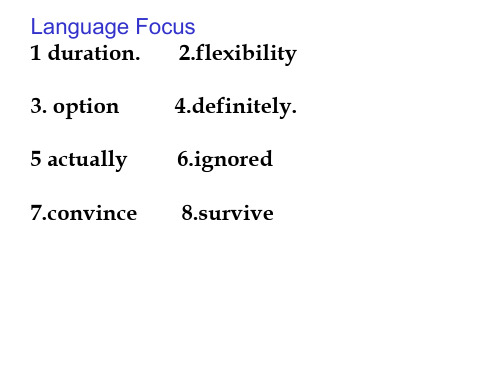
Model 2 1. Raising two children while pursuing a college degree at the same time is never easy. 2. Spending my holiday with my good friends is wonderful. 3. Forgiving his enemy is a difficult decision.
Reading in Depth 1. M 2. K 3. B 4. D 5. E 6. G 7. N 8. O 9. J 10. H
Translation
1. 大学的日程安排跟传统的高中差别很大。通常大学 课程有更多的灵活性。 2. 大学日程安排还有一件事很酷,你通常有更多机会 发展自己的兴趣爱好。 3. 总有些课程只在固定日子的固定时段开的,但是对 于大多数课程,你有很多选择。 4. 然而,在大学像在高中一样,你有机会参加各种活 动,加入不同的俱乐部和组织,甚至可能找到一份兼 职。 5. 当然,要看一个大学生一天真实生活是什么样的, 最好的方式其实是拿到一些大学生的日程表。
Language Focus 1 duration. 2.flexibility 3. option
5 actually 7.convince
4.definitely.tructures Model 1 1. He wondered what his wife's reaction would be. 2. We were asked what the likely result of the action would be. 3. They want to know what the product is made from.
21世纪大学英语应用型综合教程1 Unit1 PartB
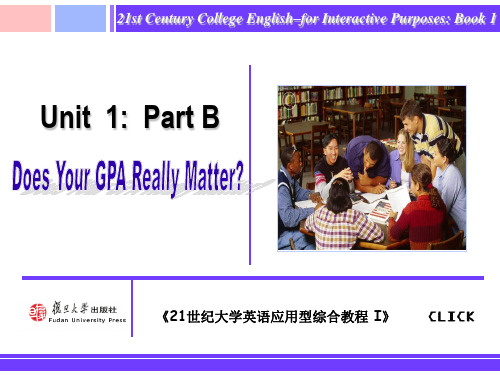
Unit 1 Exercises: Translation
For this part, you are allowed 30 minutes to translate a passage from Chinese into English.
中国设立的学位制度包括学士、硕士和博士三个学位等级 (Bachelors, Masters and Doctoral degrees)。
set up
degree system
China has set up a degree system, including Bachelors, Masters and Doctoral degrees.
Unit 1 Exercises: Translation
For this part, you are allowed 30 minutes to translate a passage from Chinese into English.
中 国 的 大 学 通 常 依 据 学 生 的 高 考 (the National Higher Education Entrance Examination)成绩招生。
based on
select one’s students
Universities in China generally select their students based on students' performances in the National Higher Education Entrance Examination.
Unit 1 Exercises: Language Focus
A. Match the following words in Column I with their explanations in Column II.
21世纪大学英语课文翻译unit1
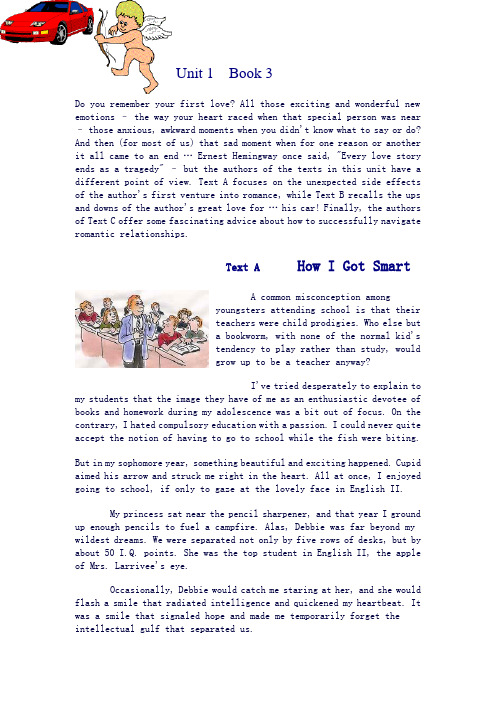
Unit 1 Book 3Do you remember your first love? All those exciting and wonderful new emotions – the way your heart raced when that special person was near –those anxious, awkward moments when you didn't know what to say or do? And then (for most of us) that sad moment when for one reason or another it all came to an end … Ernest Hemingway once said, "Every love story ends as a tragedy" – but the authors of the texts in this unit have a different point of view. Text A focuses on the unexpected side effects of the author's first venture into romance, while Text B recalls the ups and downs of the author's great love for … his car! Finally, the authors of Text C offer some fascinating advice about how to successfully navigate romantic relationships.Text A How I Got SmartA common misconception amongyoungsters attending school is that theirteachers were child prodigies. Who else buta bookworm, with none of the normal kid'stendency to play rather than study, wouldgrow up to be a teacher anyway?I've tried desperately to explain to my students that the image they have of me as an enthusiastic devotee of books and homework during my adolescence was a bit out of focus. On the contrary, I hated compulsory education with a passion. I could never quite accept the notion of having to go to school while the fish were biting.But in my sophomore year, something beautiful and exciting happened. Cupid aimed his arrow and struck me right in the heart. All at once, I enjoyed going to school, if only to gaze at the lovely face in English II.My princess sat near the pencil sharpener, and that year I ground up enough pencils to fuel a campfire. Alas, Debbie was far beyond my wildest dreams. We were separated not only by five rows of desks, but by about 50 I.Q. points. She was the top student in English II, the apple of Mrs. Larrivee's eye.Occasionally, Debbie would catch me staring at her, and she would flash a smile that radiated intelligence and quickened my heartbeat. It was a smile that signaled hope and made me temporarily forget the intellectual gulf that separated us.I schemed desperately to bridge thatgulf. And one day, as I was passing thesupermarket, an idea came to me. A sign in thewindow announced that the store was offering thefirst volume of a set of encyclopedias at thespecial price of 29 cents. The remaining volumeswould cost $2.49 each.I purchased Volume I -- Aardvark to Asteroid -- and began my venture into the world of knowledge. I would henceforth become a seeker of facts.I would become Chief Brain in English II and sweep my princess off herfeet with a surge of erudition. I had it allplanned.My first opportunity came one day in thecafeteria line. I looked behind me and there shewas.“Hi,” she sai d.After a pause, I wet my lips and said, “Know where anchovies come from?”She seemed surprised. “No, I don't.”I breathed a sigh of relief. “The anchovy lives in salt water and is rarely found in fresh water.” I had to talk fast, so that I co uld get all the facts in before we reached the cash register. “Fishermen catch anchovies in the Mediterranean Sea and along the Atlantic coast near Spain and Portugal.”“How fascinating,” said Debbie, shaking her head in disbelief.It was obvious that I had made quite animpression.A few days later, during a fire drill,I casually went up to her and asked, “Ever beento the Aleutian Islands?”“Never have,” she replied.“Might be a nice place to visit, but I certainly wouldn't want to live there,” I said.“Why not?” said Debbie, playing right into my hands.“Well, the climate is forbidding. There are no trees on any of the 100 or more islands in the group. The ground is rocky and very little plant life can grow on it.”“I don't think I'd even care to visit,” she said.The fire drill was over and we began to file into the building, so I had to step it up to get the natives in. “The Aleuts are short and sturdy and have dark skin and black hair. They live on fish, and they trap blue foxes and seals for their valuable fur.”Debbie's eyes widened in amazement.One day I was browsing through the library.I spotted Debbie sitting at a table, absorbed in acrossword puzzle. She was frowning, apparentlystumped on a word. I leaned over and asked if I couldhelp.“Four-letter word for Oriental female servant,” Debbie said.“Try amah,” I said, quick as a flash.Debbie filled in the blanks, then turned to stare at me in amazement. “I don't believe it,” she said. “I just don't believe it.”And so it went, that glorious, joyous, romantic sophomore year. Debbie seemed to relish our little conversations and hung on my every word.Naturally, the more I read, the more my confidencegrew.In the classroom, too, I was gradually makingmy presence felt. One day, during a discussion ofColeridge's “The Ancient Mariner”, we came acrossthe word albatross.“Can anyone tell us what an albatross is?” asked Mrs. Larrivee.My hand shot up. “The albatross is a large bi rd that lives mostly in the ocean regions below the equator, but may be found in the north Pacific as well. The albatross measures as long as four feet and has the greatest wingspread of any bird. It feeds on fish and shellfish. Thealbatross has an enormous appetite, and when it's full it has trouble getting into the air again.”There was a long silence in the room. Mrs. Larrivee couldn't quite believe what she had just heard. I sneaked a look at Debbie and gave hera big wink. She beamed proudly and winked back.What I failed to perceive was that Debbie allthis while was going steady with a junior from aneighboring school -- a basketball player with a C+average. The revelation hit me hard, and for a whileI felt like forgetting everything I had learned. Ihad saved enough money to buy Volume II --Asthma toBullfinch -- but was strongly tempted to invest in a basketball instead.I felt not only hurt, but betrayed. Like Agamemnon, but with lessdrastic consequences, thank God.In time I recovered from my wounds. The next yearDebbie moved from the neighborhood and transferred toanother school. Soon she became no more than a memory.Although the original incentive was gone, Icontinued poring over the encyclopedias, as well as an increasing number of other books. Having tasted of the wine of knowledge, I could not now alter my course. For:“A little knowledge is a dangerous thing:Drink deep, or taste not the Pierian spring.”So wrote Alexander Pope, Volume XIV -- Paprika to Pterodactyl.斯蒂夫· 普罗迪上学的孩子们中间有一种普遍的错误想法,即认为他们的老师当年都是些神童。
21世纪大学英语读写教程第一册.课后答案.pdf
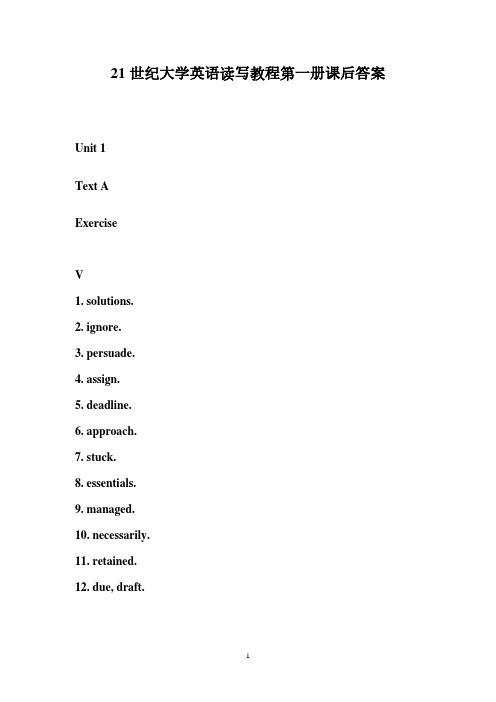
21世纪大学英语读写教程第一册课后答案Unit 1Text AExerciseV1. solutions.2. ignore.3. persuade.4. assign.5. deadline.6. approach.7. stuck.8. essentials.9. managed.10. necessarily.11. retained.12. due, draft.VI1. put in2. make the most of3. put down4. lead to5. get her hands on6. put away our picnic things7. to stick to8. time after time9. has cut down on smoking10. counts for much moreVIII1. thus cutting down on our costs2. while having his breakfast3. so that he can memorize a couple of new words everyday while cooking his meals4. thus greatly increasing his reading speed5. while studying Chinese modern history at Beijing University6. thus being able to do very well in their work7. while doing his homework8. so that you can become one, tooIX1. used to go2. got used to getting3. used to study, has got used to working4. used to say5. used to write, got used to communicatingXI1. went unnoticed2. go unpunished3. go uncorrected4. goes unnoticed, unmentioned5. go unreportedXIII. Translation1. Tom, a very curious boy, is interested not only in whats but also in whys and hows.2. According to Professor Smith, happiness is the ability to make the most of what you have.3. You’d better keep the book where your 15-year-old son can’t get his hands on it.4. The story was so funny that Bill kept laughing all the time while reading it.5. High-achieving students do not necessarily put in more time at their studies than their lower-scoring classmates.6. How did you manage to persuade these students to take the speed-reading course?7. Working hard is important, but knowing how to make the most of one’s abilities counts for much more.8. She asked her students to think for themselves rather than telling them what to think.Text BExerciseI1. opposite2. preference3. located4. feasible5. perspective6. have shifted7. concern8. attractive9. survive10. transfer11. prospect12. particularly13. treasure14. DespiteII1. on the other hand2. keep up3. As for4. for good5. turned out6. come of age7. what if8. welled upUnit 2Text AExerciseIII1. response2. bounced3. Conversation4. previous5. encouragement6. parallelIV1. entirely2. objection3. challenged4. original5. responsible6. relative7. halfway8. startled9. simply10. back and forth11. joined in12. just as13. knocked down14. came to a halt15. Even if16. fell apartV1. unconsciously2. response3. previous4. suitable5. even though6. disagree7. topic8. calling on9. switched10. and so on11. in line12. take turnsVI1. Excellence2. independence3. intelligence4. significance5. patience6. silence7. violence8. differences9. distance10. confidenceVII1. disappeared2. disorder3. dishonest4. disobey5. disagree6. disadvantages7. discomfort8. dislike9. disbelief10. dissatisfiedVIII(A)1. Whoever is most qualified2. Whoever has money3. Whoever holds it4. whoever is not with him5. whoever would take the job6. Whoever fears to face his own past(B)1. Whatever they have2. whatever decisions he makes3. Whenever the weather is bad4. wherever he goes5. Whichever direction you turn to6. however hard she triedIX1. No wonder it’s freezing cold today2. No wonder there is no picture on the screen3. No wonder many career women are not married4. No wonder they asked so many questions5. No wonder it has become a best-seller of this spring6. No wonder US students are anxious about mathXII1. Referring to the differences between American English and British English, he said, “The United States and Britain are two different countries after all.”2. Professor Smith encourages his students to think for themselves. He often says, “I am just as happy, even if you challenge me or completely disagree with me.”3. We called on him to take part in our conservation about pop music, but as soon as he joined in, he introduced a new topic and referred to the NBA finals of the previous week.4. The driver is responsible for this accident. His car knocked down a tree and a man on his bike.5. Since our production of radios came to a halt, we have switched to the production of mobile phones.6. Our original plan was to see such famous sights as the Great Wall, the Palace Museum and the Summer Palace in Beijing.7. It’s no simple matter to lea rn a foreign language well. Even thoughI have learned English for a few years, I still can’t express myselfeffectively in the language.8. I don’t want you simply to agree or disagree with me –I need someone who can give me good advice, ideas, and so on.Text BExerciseI1. academic2. intelligence3. reflects4. Social5. predicted6. context7. advantage8. attitude9. traits10. communication11. distinguish12. represented13. influences14. matureII1. getting…across2. come out3. Because of4. in short5. as a result6. as well7. in some cases8. sent outUnit 3Text A ExerciseIV1. draw2. bear3. worn out4. got tired of5. racial6. paid, attention to7. mature8. broke into9. performed10. conquer11. aspects12. As far asV1. Brought up2. broke into running3. amazed4. All his wife could do was5. resemble6. with ease7. conquered8. wear out / are worn out9. turned out10. has grown into11. tragedy12. promptlyVI1. personal2. traditional3. humorous4. logical5. courageous6. poisonous7. educational8. victoriousVII1. darkness2. carelessness3. nervousness4. preparedness5. illness6. eagerness / nervousnessVIII1. go on playing2. went on reading3. went on to explain4. went on to teach5. went on playing6. went on to tellX1. work as fast as a skilled worker2. couldn’t perform as well as his parents had expected3. he promised that he would go and see his grandparents as often as possible4. that after finishing his studies abroad he would come back as soon as possibleXII1. As far as I know, all they have to do is come and see the child they want to bring up and fill out a form.2. As he learned more and more about the world, he finally got tired of going after fame and wealth.3. The little girl’s songs bro ught sunshine to the old man and helped him bear the hardships of life.4. People came one after another to congratulate them on the successful building of another big bridge over the Huangpu River.5. All the people present were amazed that the 10-year-old boy wasplaying the violin so skillfully.6. After the car accident, Stevie reevaluated his goals in life and decided to pay more attention to the world outside.7. Mother could never have imagined that her son would become a world-famous pianist even in her wildest dreams.8. The students broke into loud cheers when they heard that their teacher had fought back from the shadow of death.Text BExerciseI1. potential2. suggestions3. realistic4. embarrassed5. impression6. negative7. presently8. reacted9. improvement10. target11. inferior12. conceptII1. built up2. dwell on3. do justice to myself4. from the start5. were based on6. set aside7. wiped out8. improve on9. do, harm10. is working on Unit 4Text AExerciseIV1. endure2. accumulated3. somewhat4. property5. informed6. wrinkled7. collapsing8. mourning9. contributed10. possessed11. recovered12. trembled13. fulfill14. drove15. stagger16. utteredV1. because of2. be blessed with3. as well as4. spoke of5. a good deal of6. at most7. stand on its feet8. be ashamed of9. as soon as10. leaning onVI1. a bearded young man2. three colored pictures3. a flowered lawn4. a gifted 〈talented〉pianist5. an old lady with a wrinkled face6. a home for the aged7. a cultured college student8. an experienced driver9. a skilled engineer10. a spirited<hitted> discussionVII1. shameless2. cheerful3. endless4. windless5. fearless6. countless7. meaningful8. colorful9. delightful10. thoughtfulIX1. Nor did he give me any explanation.2. Nor did he feel ashamed for that.3. Nor do I think it necessary to do so.4. Nor will he invite his relatives and friends.5. Nor did we know his phone number.6. Nor did she enter the home for the aged.XIII1. Sick and weak as Grandma is, she has undertaken all the housework in the family.2. The recording company had never been so pleased with any singer. For them, Stevie Wonder was a real find.3. They had no running water where they lived. Nor did they have conveniences of life such as gas and electricity.4. Six years passed, then seven and eight, and nothing was heard of that French artist. It seemed certain that he had left the country for only God knows where.5. He was very ill that summer, but as soon as he felt better in the fall, he resumed his writing and finished his novel within two months.6. Driven by a strong will, Alex finally fulfilled the task he had undertaken.7. With the help of the doctor and the nurses, the patient recovered quickly and in a few weeks was able to stand on his feet once more. 8. It was really sad to watch the old man’s wrinkled face, which spoke of all that he had endured in his life.Text BExercise B1. D2. D3. A4. B5. A6. B7. D8. A9. B10. AVocabulary Exercises I1. responsibilities2. purchase3. portrays4. vanished5. immense6. decent7. eventually8. motivation9. reputation10. restore11. neighborhood12. sustain13. upholds14. creditII1. paved the way for2. is attributed to3. out of habit4. kept his word5. open the door to6. think twice7. think of … as8. care about9. had been passed on10. To this dayUnit 5Text AExerciseV1. compromise2. content3. Unfortunately4. individual5. gamble6. spun7. attractive8. afterwards9. tradition10. unique11. arose12. energeticVI1. a little2. and so on3. as well4. give way to5. in the same way as6. had in mind7. most of the time8. have been on their feet9. went off10. are named after11. has no right to12. sorted outVII1. compromise with…over2. lying…in3. lie on4. content with5. call at6. called on7. named…after8. active in9. opinions about10. opinion ofVIII1. uncertain2. unknown3. unable4. unfortunate5. incorrect6. impatient7. illegal8. irregular9. irrelevant10. improperX1. What a pity you won’t be back before I leave!2. What a pity to waste the food!3. What a pity she isn’t here!4. What a pity that we can die only once for our country!5. What a pity that some of the best acting on stage today can only be seen by so few people!6. What a pity you can’t swim.XII1. That’s where2. That’s why3. that’s where4. That’s what5. That’s how6. That’s how7. that’s when8. that’s when9. that’s what10. That’s whereXIV1. They are Mary’s sons Robert and Lawrence. One is na med after her father; the other is named after her grandfather.2. He is not content with what has already got. What a pity he never understands that happiness lies in contentment.3. She is very active in classroom activities. I am sure she will make a good teacher.4. You may have different opinions about it, but I hate the idea of urging people to drink, especially at a dinner party.5. We are prepared to give way a little to them on minor problems, but we will never compromise with them on major questions of principle.6. Robert did not usually get much exercise during the year, while his wife Mary was on her feet most of the time. That’s why it was impossible, or difficult at least, for them to choose a place they both liked for their holiday.7. David is a young writer with a high opinion of himself. He thinks that his writing style is unique and refined. But unfortunately, that is not the case.8. All I want to say is that as individuals we enjoy many different rights, but we have no right to do anything harmful to society.Text BExerciseI1. effective2. argument3. alert4. typical5. avoid6. patience7. hostile8. mention9. significant10. complain11. bothered12. historical13. tempted14. selfishII1. lose her temper2. changed for the better3. make matters worse4. fell behind5. will take offence6. launched into7. added to8. saw eye to eye9. hold their tongues10. poke fun atUnit 6Text AExerciseIV1. shocked2. admitted3. pursue4. prefer5. intelligent6. acquire7. average8. cultivate9. typical10. pursuit11. imported12. bite13. compete14. constantly15. prestigious16. extentV1. dedicated to2. stood a chance3. held up as4. least of all5. conform to6. compares…to7. done away with8. deprived of9. looked down upon10. adapt to11. instead of12. keep upVIII1. If we are to promote higher education, we must try to make university professorships the most prestigious positions in the country.2. If we are to remain a world-class power, our universities must be able to train students to become first-class scholars and engineers.3. If you are to make your child a person of knowledge, you must encourage him to spend more time studying.4. If you are to apply for this scholarship, fill out the application form and return it now.5. If we are to further develop the economy of Shanghai, we have to make full use of the Yangtze River.XII1. The problem lies in how people look at those students dedicated to the pursuit of knowledge.2. Our government has decided to put a lot more money into education than before.3. We have to train more first-class engineers to compete in the technology race with Japan.4. The intellectually curious and hard-working students should be praised and held up as examples to other students.5. Not until we do away with our anti-intellectualism do we stand achance to remain a world-class power.6. We must adapt ourselves to the demand of our times, otherwise we’ll fall behind other industrialized nations of the world.7. The parents are proud of their son who is studying English while other children are playing football.8. Do you really expect to improve your English without spending more time studying it?Text BExerciseI1. escapes2. specific3. frequent4. similar5. profit6. trends7. creative8. customer, customer9. consumers10. diet11. manufacturer12. advertisementII1. pointed out2. goes out of fashion3. According to4. and the like5. out of date6. broke down7. comes along8. on top ofUnit 7Text AExerciseIV1. crept2. presence3. whereas4. spoiled5. previously6. roaring7. merely8. ignorant9. confident10. venture11. chased12. liberalV1. stared at2. come of3. establish itself as4. threw…at5. came up to6. are for7. move in8. viewed as9. among other things10. by chanceVI1. momentary2. lively3. attractive4. orderly5. selective6. deadly7. legendary8. protective9. constructive10. costly11. brotherly12. honorary13. progressive14. sickly15. customary16. earthly17. revolutionary18. reactionaryX1. Mr. Smith was viewed as a very liberal person who believed, among other things, that all men are equal under the law.2. It is not by chance that he won the prize; his success comes fromhis hard training.3. The teacher talked a lot with the white kids, trying to convince them that all men are created equal, but nothing much came of it in the beginning several weeks.4. As I was a newcomer to that school, I felt lonely and friendless fora time.5. Day after day Weiming kept talking with Mrs. Wilson, and his oral English became more and more fluent and natural.6. Whereas some of the kids were quite nasty during those first few weeks, a little white girl was extremely friendly to me.7. I later came to know that the man who looked old and wrinkled was only about 45.8. Soon after graduating from university, he established himself as a qualified and responsible teacher of English.Text BExercise B1. B2. A3. B4. C5. C6. B7. A8. DI1. personality2. dominates3. competent4. substituting5. respond6. somehow7. determined8. communicate9. current10. brief11. glance12. polish13. formal14. sensitiveII1. on their own2. for the most part3. kept his distance4. to no avail5. on occasion6. think…over7. lit up8. at ease9. all right10. now and then Unit 8Text AExerciseIV1. one2. that3. one4. ones5. that6. thoseV1. promises2. reliable3. project4. barely5. be abolished6. simultaneous7. endless8. primarily9. equivalents10. application11. incredible12. purpose13. acceptance14. stimulatingVI1. ran into2. serves as3. well ahead of schedule4. arises…from5. communicate with6. brought about7. take advantage of8. is sure toVIII1. unhappy2. unnoticed3. unprepared4. unanswered5. unforeseen / unexpected / unbelievable6. unfair7. unknown8. unclearIX1. unforgettable2. enjoyable3. questionable4. unimaginable5. unbearable6. regrettable7. changeable8. foreseeableXIII1. No scientist knows exactly where the information highway will lead us in the decade ahead.2. It is crucial that developed countries and developing countries increase mutual understanding and mutual respect through more communication.3. From the very beginning, the mass media paid particular attention to this treatise on the personal computer.4. My nephew had thought that Japanese, which is similar to Chinese in many ways, was easy to learn, but it was not the case.5. You should have known better. The way a college professor teaches is not confined only to telling his students the basic facts. He or she also stimulates discussions and debates.6. It was originally estimated that the project would take five years. But thanks to the creativity of the workers as well as the engineers, it was finished well ahead of schedule.7. The process of thinking about and writing his autobiography took the American writer more than three years, during which he ran into many unimaginable difficulties.8. The doct ors aren’t sure what illness he is suffering from. That’s why he had decided to retire ahead of schedule.Text BExercise C1. D2. B3. A4. D5. B6. CI1. occupation2. artificial3. summarize4. solves5. sample6. identify7. extraordinary8. available9. consult10. environmental11. capability12. relationshipII1. has been turned … into2. a variety of3. was responsible for4. is capable of5. in control of6. in relation to7. gave up8. stopped dead .。
Unit1-21世纪大学英语应用型综合教程第一册
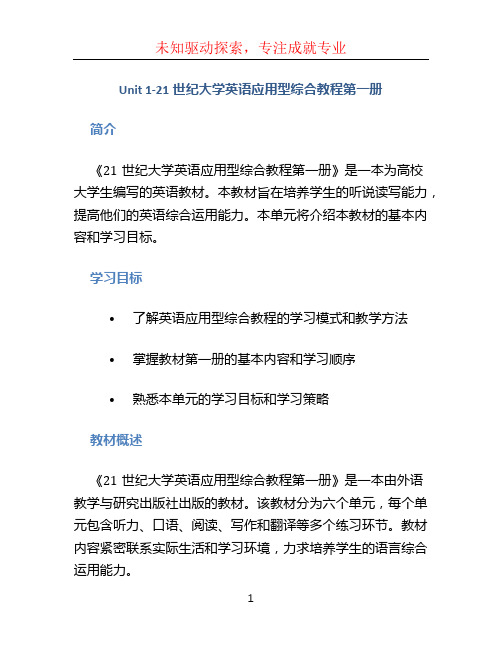
Unit 1-21世纪大学英语应用型综合教程第一册简介《21世纪大学英语应用型综合教程第一册》是一本为高校大学生编写的英语教材。
本教材旨在培养学生的听说读写能力,提高他们的英语综合运用能力。
本单元将介绍本教材的基本内容和学习目标。
学习目标•了解英语应用型综合教程的学习模式和教学方法•掌握教材第一册的基本内容和学习顺序•熟悉本单元的学习目标和学习策略教材概述《21世纪大学英语应用型综合教程第一册》是一本由外语教学与研究出版社出版的教材。
该教材分为六个单元,每个单元包含听力、口语、阅读、写作和翻译等多个练习环节。
教材内容紧密联系实际生活和学习环境,力求培养学生的语言综合运用能力。
学习内容第一单元:自我介绍第一单元主要以自我介绍为话题,学生将学会如何介绍自己的个人信息、职业、兴趣爱好等。
同时,学生还将练习询问他人的个人信息并进行介绍。
第二单元:日常生活第二单元主要以日常生活为话题,学生将学会如何描述日常活动,介绍家庭情况,谈论购物和聚会等话题。
第三单元:学习与工作第三单元主要以学习与工作为话题,学生将学会如何描述学习和工作的内容、时间安排和感受。
第四单元:旅行与交通第四单元主要以旅行与交通为话题,学生将学会如何描述旅行的目的地、交通工具和行程安排,以及与旅行相关的事宜。
第五单元:社交与娱乐第五单元主要以社交与娱乐为话题,学生将学会如何描述社交活动、娱乐形式和参加娱乐活动的感受。
第六单元:科技与创新第六单元主要以科技与创新为话题,学生将学会如何讨论科技的发展、创新的形式和科技对生活的影响。
学习策略•多听多说:通过多听英语的听力材料和多与他人进行英语口语对话,提高英语听说能力。
•多读多写:通过阅读英语文章和写作练习,提高英语阅读和写作能力。
•课外拓展:积极参加英语角、英语演讲比赛等活动,提高英语沟通和表达能力。
•利用网络资源:通过使用英语学习网站、在线词典和学术论坛等资源,拓宽自己的英语知识和技能。
总结《21世纪大学英语应用型综合教程第一册》是一本旨在培养大学生英语综合运用能力的教材。
《21世纪大学新英语》第一册课后题标准答案及解析
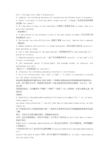
点评:这句话的主干就是一个祈使句be careful of taking too much time for yourself。前面的部分是
独立主格结构。独立主格结构(Absolute Structure)是由名词或代词加上分词等构成的一种独立结
构,用于修饰整个句子。独立主格结构中的名词或代词与其后的分词等构成逻辑上的主谓关系。这
3. Often it is tempting to sleep through early morning class or skip it altogether — resist temptation.
Make it a priority to attend all of your classes on time.
上海复社图文制作中心 21世纪大学新英语读写译教学参考书(一) 五样稿
点评:原句用的是倒装句,中文句子就没有必要用倒装句型。
2. ...however, in the 1960s it was no where near as important as it is today.
……但是,二十世纪六十年代的西班牙语和今天的西班牙语的地位不可同日而语。
Unit 1 College Life:Task 5 Translation
A. Complete the following sentences by translating the Chinese given in brackets.
1. There’s no point in fretting about things you can’t change(为无法改变的事情而发愁 fret about).
21世纪大学英语综合教程第一册课后练习答案

21世纪⼤学英语综合教程第⼀册课后练习答案Unit 15. Fill in the blanks with the words given below. Change the forms where necessary.1. George is a ______boy; he is one of the best students in his class.2. You have to work hard if you want _________ in your courses.3. _______ after you left, a girl came into our office looking for you.4. At first, the course was a bit difficult for me but I _______ to pass the final exam with a fairly good grade.5. Mary is my best friend and I always _______ my secrets(秘密)with her.6. The lost traveler was filled with _____ when he saw a bear(熊)running toward him.7. When you’re away from your family, you have to be ___________for yourself.8. At first, he was afraid of being off by himself. Shortly, __________, he became used to living alone.9. Children in China ______school at the age of 6 or 7 and must study there for at least nine years.10. The earth is ___________ by air, which makes up its atmosphere (⼤⽓层).11. If you can’t _______ the job, I’ll get someone else to do it.12. John was so ________ and warm in bed that he didn’t want to get up.6. Fill in the blanks with the expressions given below. Change the forms where necessary.1. You can ask him for advice but the final choice ______ you.2. Everything is developing(发展)so quickly in today’s world thatI am afraid I can’t _________ all the changes.3. The brave sailors(海员)managed to keep their boat _________ during the storm.4. If ________ you don’t succeed, try, try again.5. The boy said that he wanted to be a computer scientist(科学家)when he ________ .6. Today young people from different countries can easily ________________ one another through email.7. Mark wanted to finish his homework in two hours, but it____________ to be harder than he thought.8. Tom fell and broke his leg. __________, he would have to be away from school for a month or two.9. A new school has been ________ there.10. _________, I have something else to do this weekend.9.Translate the following sentences into English.1. 约翰既聪明⼜有责任⼼。
21世纪大学英语第一册答案
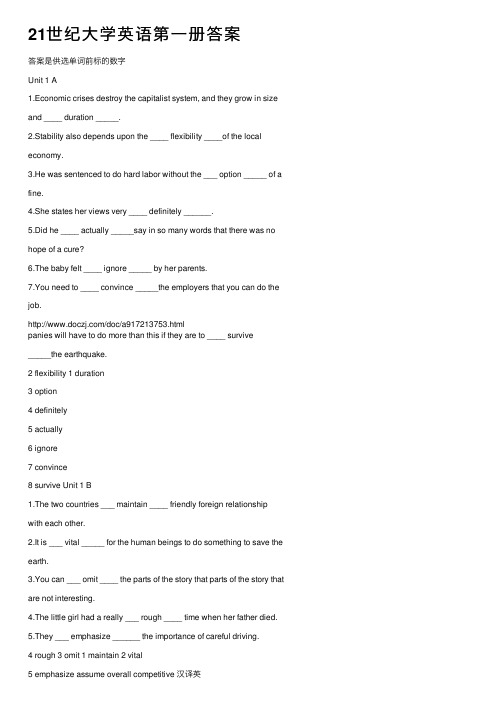
21世纪⼤学英语第⼀册答案答案是供选单词前标的数字Unit 1 A1.Economic crises destroy the capitalist system, and they grow in size and ____ duration _____.2.Stability also depends upon the ____ flexibility ____of the local economy.3.He was sentenced to do hard labor without the ___ option _____ of a fine.4.She states her views very ____ definitely ______.5.Did he ____ actually _____say in so many words that there was no hope of a cure?6.The baby felt ____ ignore _____ by her parents.7.You need to ____ convince _____the employers that you can do the job./doc/a917213753.htmlpanies will have to do more than this if they are to ____ survive_____the earthquake.2 flexibility 1 duration3 option4 definitely5 actually6 ignore7 convince8 survive Unit 1 B1.The two countries ___ maintain ____ friendly foreign relationship with each other.2.It is ___ vital _____ for the human beings to do something to save the earth.3.You can ___ omit ____ the parts of the story that parts of the story that are not interesting.4.The little girl had a really ___ rough ____ time when her father died.5.They ___ emphasize ______ the importance of careful driving.4 rough 3 omit 1 maintain 2 vital5 emphasize assume overall competitive 汉译英1.你的⽼师在评卷的时候会把你⽣病的情况考虑在内。
21世纪大学英语1Unit 1 (1)

I. Discussions of some points in Warm-up. ▲ Time to get a move on. (translation) ▲ ... if your mom were here, ... sorority. (grammar) ▲ ... right by your side every step of the way
It makes you wonder about the effect on men's behaviour.
这让人怀疑其对男性行为的影响。 It's a wonder that it took almost ten years. 这差不多用了10年的时间,真是桩奇事。
Dr Williams describes it as a potential wonder drug 威廉斯医生称其可能会成为特效药。
• ▲ straight adj. 直的; 连续的; 直率的; 整齐的
adv. 直地; 直接地; 坦率地; 立即
Examples: He finished his conversation and stood up, looking
straight at me. 他说完话站起来,直视着我。
We'll go to a meeting in Birmingham and come straight back. 我们将去伯明翰参加会议,然后马上回来.
• Look and talk
Directions: There are a few pictures here. Please watch, think, and talk about them .来自•Text A
A Day in the Life of a College Student
21世纪大学实用英语-(U版)Unit1
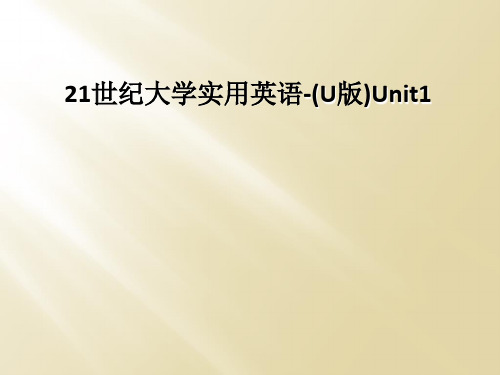
4) Para. 6
i. Questions:
1. What did he think of his future at that time?
2. What does the expression “this important hurdle in my life” mean?
ii. Language points
say, whenever that happens.
ii. Language Points ---Words and Phrases
perspective: n. a way of looking at things and forming a judgment.
e.g. The Table 1 below gives some perspective of this.
succeed: vi. do what one is trying to do; achieve the desired end.
e.g. If you can learn, you can succeed in school. If you try hard, you will succeed.
e.g. His routine work is to rub the coal through
a sieve. look upon/on: regard(sb.or sth.) in the
specified way. e.g. They look upon it quite as their own, I dare
be off: leave or be away. e.g. I must be off now. (I must leave now.)
全新21世纪大学英语1-Unit1
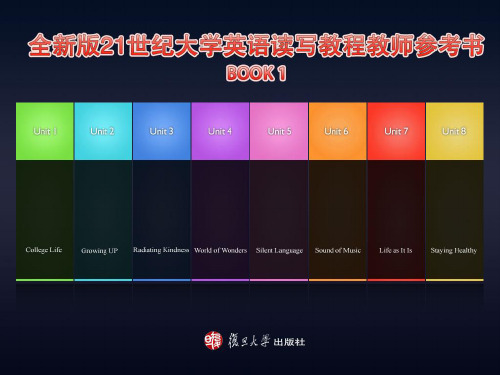
Video Starter
To begin, we‟ll watch a video clip and try to grasp its message. Getting to know the words and expressions in the box below first may be helpful.
Now that the students have fully understood the Video Starter, you can ask some of them to dub(配 音) the video if time permits. Correct their errors in pronunciation and intonation.
2) What do we need to do right now?
To redefine ourselves more fully. 3) What does it mean to build ourselves? To shape our own future.
4) Why do you think the speaker says that to build oneself is a painstaking journey of adventure? Because it is not an easy path to develop into an intellectually strong person. Tapping one’s potential to the full (充分发挥自己的潜能) means taking risks — it’s a process of adventures.
Text A
21世纪大学英语课文翻译
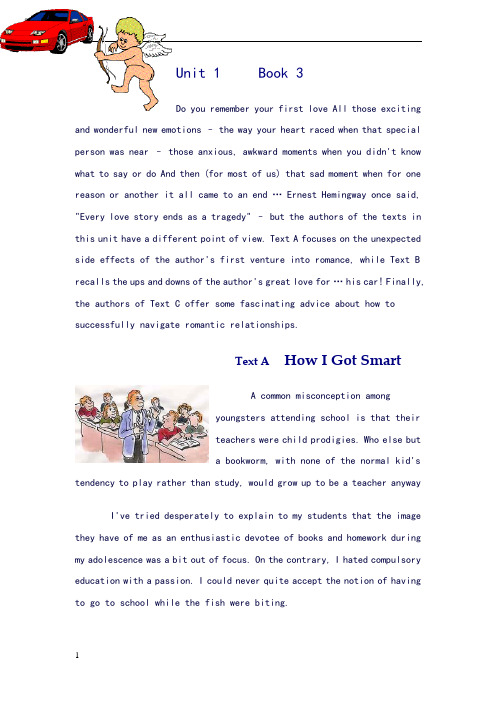
Unit 1 Book 3Do you remember your first love All those exciting and wonderful new emotions –the way your heart raced when that special person was near – those anxious, awkward moments when you didn't know what to say or do And then (for most of us) that sad moment when for one reason or another it all came to an end … Ernest Hemingway once said, "Every love story ends as a tragedy" – but the authors of the texts in this unit have a different point of view. Text A focuses on the unexpected side effects of the author's first venture into romance, while Text B recalls the ups and downs of the author's great love for … his car! Finally, the authors of Text C offer some fascinating advice about how to successfully navigate romantic relationships.Text A How I Got SmartA common misconception amongyoungsters attending school is that theirteachers were child prodigies. Who else buta bookworm, with none of the normal kid's tendency to play rather than study, would grow up to be a teacher anyway I've tried desperately to explain to my students that the image they have of me as an enthusiastic devotee of books and homework during my adolescence was a bit out of focus. On the contrary, I hated compulsory education with a passion. I could never quite accept the notion of having to go to school while the fish were biting.But in my sophomore year, something beautiful and exciting happened. Cupid aimed his arrow and struck me right in the heart. All at once, I enjoyed going to school, if only to gaze at the lovely face in English II.My princess sat near the pencil sharpener, and that year I ground up enough pencils to fuel a campfire. Alas, Debbie was far beyond my wildest dreams. We were separated not only by five rows of desks, but by about 50 . points. She was the top student in English II, the apple of Mrs. Larrivee's eye.Occasionally, Debbie would catch me staring at her, and she would flash a smile that radiated intelligence and quickened my heartbeat. It was a smile that signaled hope and made me temporarily forget theintellectual gulf that separated us.I schemed desperately to bridge thatgulf. And one day, as I was passing thesupermarket, an idea came to me. A sign in thewindow announced that the store was offering thefirst volume of a set of encyclopedias at the special price of 29 cents. The remaining volumes would cost $ each.I purchased Volume I -- Aardvark to Asteroid -- and began my venture into the world of knowledge. I would henceforth become a seeker of facts.I would become Chief Brain in English II and sweep my princess off her feet with a surge of erudition. I had it all planned.My first opportunity came one day in thecafeteria line. I looked behind me and there shewas.“Hi,” she said.Aft er a pause, I wet my lips and said, “Know where anchovies come from”She seemed surprised. “No, I don't.”I breathed a sigh of relief. “The anchovy lives in salt water and is rarely found in fresh water.” I had to talk fast, so that I could get all the facts in before we reached the cash register. “Fishermen catch anchovies in the Mediterranean Sea and along the Atlantic coast near Spain and Portugal.”“How fascinating,” said Debbie, shaking her head in disbelief.It was obvious that I had made quite animpression.A few days later, during a fire drill,I casually went up to her and asked, “Ever beento the Aleutian Islands”“Never have,” she replied.“Might be a nice place to visit, but I certainly wouldn't want to live there,” I s aid.“Why not” said Debbie, playing right into my hands.“Well, the climate is forbidding. There are no trees on any of the 100 or more islands in the group. The ground is rocky and very little plant life can grow on it.”“I don't think I'd even care to visit,” she said.The fire drill was over and we began to file into the building, so I had to step it up to get the natives in. “The Aleuts are short and sturdy and have dark skin and black hair. They live on fish, and they trap blue foxes an d seals for their valuable fur.”Debbie's eyes widened in amazement.One day I was browsing through the library.I spotted Debbie sitting at a table, absorbed in acrossword puzzle. She was frowning, apparentlystumped on a word. I leaned over and asked if I could help.“Four-letter word for Oriental female servant,” Debbie said.“Try amah,” I said, quick as a flash.Debbie filled in the blanks, then turned to stare at me in amazement. “I don't believe it,” she said. “I just don't believe it.”And so it went, that glorious, joyous, romantic sophomore year. Debbie seemed to relish our little conversations and hung on my every word. Naturally, the more I read, the more my confidence grew.In the classroom, too, I was gradually makingmy presence felt. One day, during a discussion ofColeridge's “The Ancient Mariner”, we came acrossthe word albatross.“Can anyone tell us what an albatross is” asked Mrs. Larrivee.My hand shot up. “The albatross is a large bird that lives mostly in the ocean regions below the equator, but may be found in the north Pacific as well. The albatross measures as long as four feet and has the greatest wingspread of any bird. It feeds on fish and shellfish. The albatross has an enormous appetite, and when it's full it has trouble getting into the air again.”There was a long silence in the room. Mrs. Larrivee couldn't quite believe what she had just heard. I sneaked a look at Debbie and gave hera big wink. She beamed proudly and winked back.What I failed to perceive was that Debbie allthis while was going steady with a junior from aneighboring school -- a basketball player with a C+average. The revelation hit me hard, and for a while I felt like forgetting everything I had learned. I had saved enough money to buy Volume II --Asthma to Bullfinch -- but was strongly tempted to invest in a basketball instead.I felt not only hurt, but betrayed. Like Agamemnon, but with less drastic consequences, thank God.In time I recovered from my wounds. The next yearDebbie moved from the neighborhood and transferred toanother school. Soon she became no more than a memory.Although the original incentive was gone, I continued poring over the encyclopedias, as well as an increasing number of other books. Having tasted of the wine of knowledge, I could not now alter my course. For:“A little knowledge is a dangerous thing:Drink deep, or taste not the Pierian spring.”So wrote Alexander Pope, Volume XIV -- Paprika to Pterodactyl.斯蒂夫· 普罗迪上学的孩子们中间有一种普遍的错误想法,即认为他们的老师当年都是些神童。
- 1、下载文档前请自行甄别文档内容的完整性,平台不提供额外的编辑、内容补充、找答案等附加服务。
- 2、"仅部分预览"的文档,不可在线预览部分如存在完整性等问题,可反馈申请退款(可完整预览的文档不适用该条件!)。
- 3、如文档侵犯您的权益,请联系客服反馈,我们会尽快为您处理(人工客服工作时间:9:00-18:30)。
Intensive Study 6
3. Organize your materials. At school, Tom played
Intensive Study 2 How do A students like these make it? Brains aren’t the
only answer. The most gifted students do not necessarily
perform best in exams. Knowing how to make the most of one’s abilities counts for much more.
study when you’re overtired isn’t smart,‖ she advises. ―Even
a short break to stretch or get some fresh air can work wonders.‖
Intensive Study 8 5. Learn how to read. ―I used to spend hours going through irrelevant material,‖ Amanda remembers. ―But then I got used to reading quickly; if the first sentence of a paragraph wasn’t relevant, I’d move on to the next paragraph.‖ ―The best course I ever took,‖ says an Oklahoma student, ―was speed-reading. I not only increased my words per minute but also learned to look at a book’s table of contents and pictures first. Then, when I began to read, I had a sense of the material and I retained a lot more.‖ To such students, the secret of good reading is to be an active reader — one who keeps asking questions that lead to a full understanding of the material being read.
basketball. ―I was too busy to waste time looking for a pencil
or a missing notebook. I kept everything just where I could
get my hands on it,‖ he says. Paul, a student in New Mexico, keeps two folders for each subject — one for the day’s
4. Organize your time. When a teacher set a long essay,
Alex would spend a couple of days reading round the subject
and making notes, then he’d do a rough draft and write up
Text Organization
The structure of Text A
I.
The importance of the study skills by two specific examples
Para. 1-3
II.Βιβλιοθήκη Secrets of A students—8 study skills
Intensive Study
Secrets of A Students
By Edwin Kiester & Sally Valentine Kiester
1
Alex, now a first-year student in natural sciences at
Cambridge, played football for his school in Manchester and directed the school production of a play. He left school with five A’s. Amanda, reading English at Bristol University, acted in plays at hers, and played tennis regularly. Yet she still managed to get four A’s.
assignments, the other for homework completed and ready to
hand in. A drawer keeps essentials together and cuts down on time-wasting searches.
Intensive Study 7
Intensive Study 4
1. Concentrate! Top students allow no interruptions of
their study time. Once the books are open, phone calls go unanswered, TV unwatched and newspapers unread. ―This
21st Century College English: Book 1
Unit 1 : Text A
Secrets of A Students
Unit 1: Text A
• Lead-in Activities • Text Organization • Reading & Writing Skills • Language Points • Guided Practice
I call her before I start my homework. Then when I sit down
to study, I can really focus.‖
Intensive Study
5
2. Study anywhere — or everywhere. A university
3 Hard work isn’t the whole story either. Some of these
high-achieving students actually put in fewer hours than their lower-scoring classmates. The students at the top of the class get there by mastering a few basic techniques that others can easily learn. Here, according to education experts and students themselves, are the secrets of A students.
doesn’t mean ignoring important things in your life,‖
Amanda explains. ―It means planning your study time so that you can concentrate. If I’m worried about a sick friend,
professor in Arizona assigned to tutor underachieving college athletes, recalls a runner who exercised daily. He
persuaded him to use the time to memorise biology terms.
• Assignment
Lead-in Activities: Warm-up Questions
1. Based on the title, guess what the text is about. 2. Look at the subheadings, 1-8, in the text. Which of these activities do you already do? In which areas do you feel you need improvement? 3. Are there any ―secrets‖ to your own success as a student? In other words, do you have any special study techniques which have been very successful for you?
Para. 4-11
III. Conclusion: Anyone can become A
students if you can learn and master these secrets.
Para. 12
Reading & Writing Skills
Exposition.
This text is a typical “how-to-do-things essay”. This kind of article is ususlly divided into two parts: first part, the importance of doing this; the second part, the concrete methods or procedure of doing it. And the second part is the main body of the article. General speaking, there’s a topic sentence at the beginning of the text to express the thesis and a conclusion sentence at the end. In this text, after the examples at the beginning, the author tells us the topic sentence ―The students at the top of the class get there by mastering a few basic techniques that others can easily learn.‖. To match the topic sentence, the author gives us the conclusion sentence ―After all, the secrets of A students are not so secret. You can learn and master them and become an A student, too.‖
